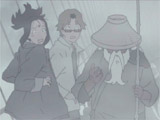

Quick Links:
Earth Girl Arjuna, Volume 2: Journey
I'm not an environmentalist. I'm not against saving the whales or hugging the trees or whatever it is they do, exactly, but when it comes to my concerns about the world I tend to gravitate towards human-centered issues. I do not feel this makes me a bad person. It does, however, make me not the ideal person to review "Arjuna." Sure, I can enjoy the fun mahou shoujo-isms and the cute--though few and far in between--cracks on Japanese consumerism, but on the whole the series just smacks of devotion to an issue for which I could care less. That's not to say it's a bad anime, just not for me.
Last volume was a mess (a fun mess, but a mess nonetheless); the first two episodes focused on nuclear power, but then it gave us nothing more than a monster of the week battle to end that plot thread before moving on the next. I realize that mahou shoujo series do this all the time--start out with an unimportant mini-arc to help the heroine realize her powers--but when you have an anime that's trying to deal with Big Issues, one would hope they'd delve a little further into the concern at hand. Luckily, volume 2 starts off on a new track, and is able to allow it to reach its conclusion. And the Big Issue this time is organic produce farming. Really. No, really. Really!!! I know; I don't get the logic here either, but if the writer felt this was a rational progression of issues, then I won't argue (too much).
Apparently in the mountains of Japan there is a Mystical Mojo Man (and I'm not just labeling him that because of his hackneyed archetype; they really do never give us his name) who lives isolated from the Evil Industrialized Communities and lives off of his Mystical Mojo Organic Produce Farm. Oh, and he's also wise beyond his years and seems to be knowledgeable about the nature magic Juna's tapping into, but that goes without saying. For what it's worth, I kind of liked this little foray, even if it is neck-deep in clichés. There is an intentionally peaceful tone that resonates throughout the entire episode, and it provided a nice, grounded calm to work with while exploring the mechanics of Juna's newfound powers and the Raaja. As previously hinted, her abilities seem to be mostly psionics, in that she is in tune with the cycle of nature and can not manipulate the earth but instead just gain knowledge and physical powers from it. And the Raaja, well I won't spoil it, but I must say it's better than just a monster of the week, which surprised me.
When Juna and Tokio get home from their little escapade, the show loses me. It goes on with the organic food theme, but then develops into a journey in the bowels of sick people in what came off as a very twisted episode of the Magic School Bus. It's terribly CGI-animated, and the whole scene is really pathetic and ruins the sense of class the creators have attempted to maintain in favor of a cheesy and completely ridiculous "action" sequence. And yet, if they looked hard enough they could have seen that they already had an interesting story that episode in the rift Juna's powers are causing in her relationship with Tokio. This is a very interesting little development here, and I think the next episodes really prove that while the writers are pathetic with the plot so far, they have their characters nailed. Tokio obviously represent the neutral, industry-happy party in the debate (which I belong to), and it will be intriguing to see if the writers attempt to change him "for the better," or allow him to pose as a counterweight for Juna's new concerns. Obviously, I'm hoping for the latter.
The other cast members here are also providing some of the high notes in the series. The scene with Juna's teacher's 'true' lecture is fascinating (if a teensy bit ham-fisted), and also some of the more subtle moments really seems to quietly flesh out characters that at first seemed clichéd. This is especially apparent with Cindy, who, in just one sentence, seemed to nicely spell out her motivations and psychosis. That's good, meaty stuff, and the writers would do best to leave the ridiculous mystic plot behind and center around the character-related material.
The audio and visuals are good, as always. There was less of an emphasis on Juna fully transforming than in last volume, so the character designs aren't particularly garish (and how that Carrot Top hair is in any way related to the power of nature I don't know). Again, the nature scenes are nice and colorful, which is especially apparent in the scenes at the Mystic Mojo Organic Produce Farm. The music is still leaning on a blend of mystical folk, with wind chimes, organs, and bells often used for emphasis; but really I found it all rather bland. However, my neutral feelings about the music do not extend to the BGM of the menus, which for some odd reason really grate my nerves. I've actually trained myself to press the buttons quick enough so the music never gets fully cued; that's how bad it is.
Speaking of the presentation, it's the same as before. The case art is nice, and for once an anime distributor actually titled a volume to represent the theme of the content within. How unusual. Also, the extras are kind of bland, with the interview with the Japanese creator just as shallow and uninformative as those things usually are.
So, really, "Arjuna" is a good show. It's not great, but there are many things worse out there. It has convictions, and though I don't always agree with them, it's nice to see a show that is thoughtful on a few (ok, too many) issues. And though the plot is getting increasingly vague and ridiculous, the characters are becoming that much more interesting and real. A nice little package.
Distributor: Bandai Entertainment Creator: Shoji Kawamori / Satelight Released: 2001
Video Quality: A Audio Quality: A- Presentation: B- Content: B Overall: B



